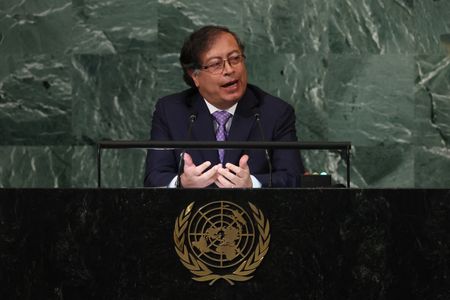(Reuters) – Colombian President Gustavo Petro called on Latin American countries to join forces to end the war on drugs during a speech to the United Nations General Assembly in New York on Tuesday.
Petro, Colombia’s first leftist president, has long derided the global war on drugs as a failure, even using his inauguration speech in August to call for a new international strategy to fight drug trafficking.
“From my wounded Latin America, I demand you end the irrational war on drugs,” Petro said, while calling on the wider Latin American community to unite to defeat that “which torments our body.”
Drug trafficking and the war on drugs are major contributors to Colombia’s armed conflict, according to a report from the country’s truth commission, which was established as part of a 2016 peace deal with the now demobilized FARC guerrillas.
The South American country, considered the world’s top producer of cocaine, comes under frequent pressure from prime ally the United States to reduce cocaine output.
In July, the U.S. White House Office of National Drug Control Policy (ONDCP) reported that Colombia’s potential cocaine output fell to 972 tonnes in 2021 from 994 tonnes the previous year.
Colombia’s area taken up by crops of coca, the chief ingredient in cocaine, also declined last year to 234,000 hectares (578,227 acres), down from 245,000 hectares in 2020, the ONDCP said.
Petro, who has also promised to ease Colombia away from its dependence on hydrocarbon exports, also criticized a global addiction to oil and coal, adding that efforts to stop global warming were not working.
“The fight against the climate crisis has failed,” he said.
(Reporting by Oliver Griffin; Editing by Marguerita Choy)
